Review: "Dungeon Crawl Classics" - By Goodman Games
If you grok the DCC attitude and vibe, you won't be able to play this game and not have fun.
The year 2023 has almost turned out to be the year of Dungeon Crawl Classics for many of us in the Mythic Mountains RPG play club. We had the incredible good fortune of finishing a 6 month long “adventure module crawl” campaign, have used Dungeon Crawl Classics to play in classic TSR adventures, played through several of the wacky official published “funnels” together, experimented with some of the boxed settings, zines, used DCC for modern modules and some amazing homebrew too.
What is DCC?
Often times people will ask “What is unique about Dungeon Crawl Classics?” I usually point out that Goodman Games has put that right up front on one of the first pages of the book.
Dungeon Crawl Classics is a modern RPG with some old school art and attitude that is simple and fun to play.
It's:
a pseudo-retro-old school D&D formula
a modern game
inspired by the magic and combat of Warhammer Fantasy Roleplay
inspired by the archetypal classes of Basic and Expert D&D
Uses an excellent unified D20 formula but with a larger dice chain than regular D&D
Is oozing with flavor and attitude.
The key thing I want to express about Dungeon Crawl Classics (DCC for short) in this blog is to understand it
it's much less about it's game mechanics and much more about it's “attitude.”
I believe this is the key to understanding and enjoying DCC to it's fullest.
What is the “Dungeon Crawl Classics attitude?”
DCC is self-deprecating, self-referential and often full of satire about old school gaming culture and attitudes. It comes from the 4e days when Goodman Games were already publishing adventures under the D20 license before they released their own system. They would begin such adventures with a musing like:
“Remember the good old days, when adventures were underground, NPCs were there to be killed, and the finale of every dungeon was the dragon on the 20th level? Those days are back. Dungeon Crawl Classics adventures don’t waste your time with long-winded speeches, weird campaign settings, or NPCs who aren’t meant to be killed. Each adventure is 100% good, solid dungeon crawl, with the monsters you know, the traps you remember, and the secret doors you know are there somewhere.”
(Sailors on the Starless Sea 2012 Goodman Games by Harley Stroh)
It's clear that the original wave of OSR godfathers were keenly aware that they carried a bitterness toward the modern game.
This “punk attitude”, or “rebel spirit” toward the modern playstyle and culture wouldn't just stay a simmering resentment nor a triumphalism with the victory they held in the renaissance of old school gaming. The game both has something important to say, but also doesn’t take itself seriously. Poking fun at their own overly sanctimonious pretensions about “how the game should be” would become a constant joke in the pages of DCC.
This humor and punk spirit would be turned up to an “11” in the pages of Dungeon Crawl Classics in 2011. It would grow wild along with it's community and artwork. It’s not enough to just display hapless villagers holding chickens in the dark against eldritch alien monstrosities for which they have no chance of survival or even sanity. Heroes would be shown with ‘fro's’, bell bottoms and rhinestone encrusted levi jackets.
This spirit is infectious. Goodman Games enlists the help of super passionate fans that carry this attitude to in person game stores and the zine culture both on their website, fan communities and their “Road crew.”
Dungeon Crawl Classics doesn't stay limited to just attempting to recreate a vibe from the original game, but embraces the satire of a time that never actually was. It is a “pseudo-history” of retro-D&D culture. It doesn't just borrow from the holy texts of Appendix N (though it does that heavily) but also from Saturday morning cartoons from the 80’s and other pop culture from the 70's.
This might make Dungeon Crawl Classics sound “gimmicky” like a “one off” game to try but certainly not durable for long campaigns or years of investment. However, there are other things about the game that have made it one of the top tabletop RPGs that many people have enjoyed for over a decade and continue with no end in sight.
First the design of the game, while having this pseudo-retro veneer on the front of it, has some really deep things to say in it’s actual pages by some of the best designers in the industry. It becomes not just a statement about the “old school reaction” but something that moves the hobby forward. DCC adventures and products are made by some of the greatest geniuses for how adventures and tabletop RPG gaming works, regardless of the game.
People like Brendan LaSalle, Chris Doyle, Harley Stroh, Michael Curtis and Joseph Goodman himself.
Serious things said about game design in the book:
Magic can be truly dangerous and mysterious and you can still roll dice and have fun with it - Dungeon Crawl Classics subverts the D&D Vancian Magic “spell slot” formula. You can cast magic as much as you want, but you always contend with that magic as something that you can lose control over. This doesn’t mean you can’t reliably roll dice though, and it’s always fun to do. I have found misfires and mutations to be so rare that as a spellcaster, I actually looked forward to them coming up. Add to that mercurial effects to magic that make spells weird and unique to each spellcaster as well as manifestations, and usually people have been on the edge of their seat waiting to see what wacky thing happens every time the wizard or elf casts a spell.
Fighters can be unique and interesting - Fighters have the reputation of being boring, and that ends with Dungeon Crawl Classics. Fighters in DCC can declare a mighty deed whenever they attack. Some of these I’ve experienced have been landing on a titan from a 40 ft leap and driving a magic spear through their brain and doing an over-the-shoulder, anime, “cool guys don’t look back” underbelly gutting of a fledgling frog god.
A medieval fantasy world can be full of wonder and exploration because of it's restraints
Every element of the game can drive adventure. A restraint in the world or obstacle is always an opportunity for more adventure.
A great chant arises from the DCC community when you ask how to accomplish something in the game. How do you become more powerful? How do you identify magic items? Learn new spells? Accomplish deeds and goals in the world? What makes your character unique?
Quest for it!
Dungeon Crawl Classics has lead people back to one of the most important elements lost in modern Dungeons and Dragons. From lists of skills, feats and prestige classes that sometimes feel like doing taxes, characters return to adventure in the fiction. This would go on to be one of the central pillars of indie and OSR gaming we have today.
The world is made mysterious and vast when even common monsters are tweaked in unexpected ways and expectations subverted.
Much of the chonky tome that is Dungeon Crawl Classics are just optional tools for Judges (which can be used to great effect in other games by the way!)
Dungeon Crawl Classics suggests that no magic sword should exist as simply “Magic Sword +1.” It should have a name, a personality, a history. It should be complicated and invite further mystery, investigation and adventure. Perhaps most importantly, you should rarely hear in a Dungeon Crawl Classics game “You see three Orcs.”
Yes, you can describe Orcs instead of simply saying what they are, but better than that, what if they Orcs were infected with a corruption from the Tree-god Yddgrl and sprouted tentacle vines and multiple eyes? Monsters in Dungeon Crawl Classics are uncomfortable chimeras, horrifying wonders, never merely a commonly known archetype fitting neatly into a compartment of well-established expectations.
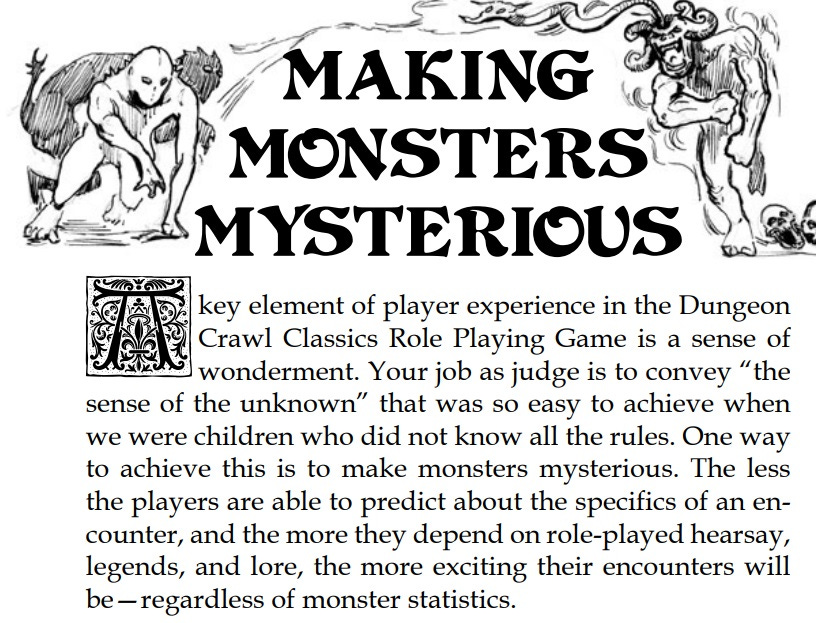
The second thing that makes Dungeon Crawl Classics an evergreen tabletop experience is the community.
The freedom to be silly with this “pseudo-retro-ism” has encouraged the community to keep exploding in a fractal of chaos as if the multiverse has ripped open a vortex of madness, and the mad sorcerers of Goodman Games laugh as they encourage the tendrils of this chaos to spread and grow.
DCC is no longer limited to medieval euro-centric fantasy adventuring of classic D&D, but has spiraled into every conceivable genre and trope and thread of it’s pseudo-retro era.

Entire giant box sets that are some of the most “full” box sets you can find in the industry that cover the holy texts of Appendix N including “Peril on the Purple Planet”, “DCC Lankhmar” and recently “Dying Earth”
There’s even a whole different version of the game for weird, post apocalyptic adventures: “Mutant Crawl Classics”
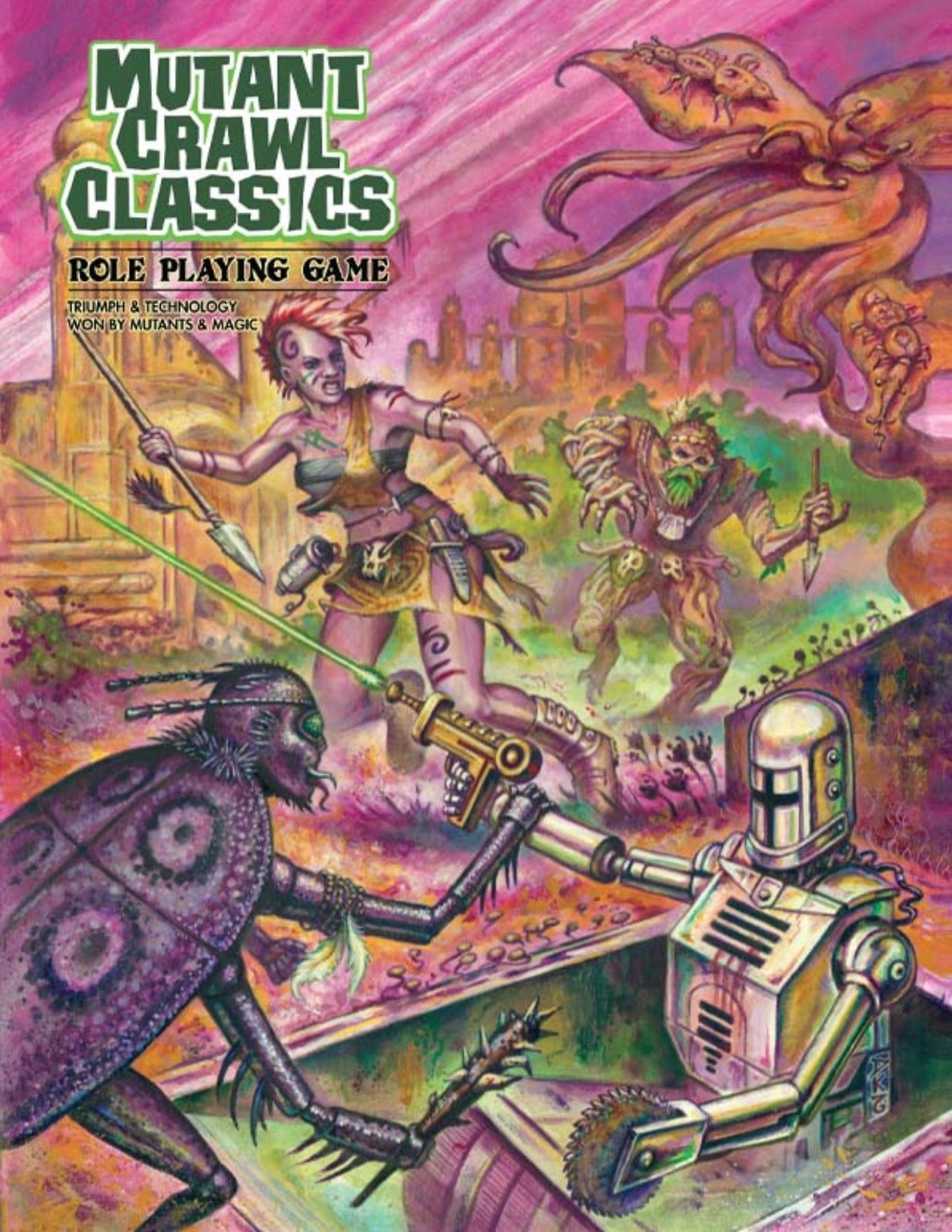
There’s probably an entire lifetime of fun to be had just playing content for Dungeon Crawl Classics, and the pace of content creation doesn’t seem to be slowing down.
The actual business of “Goodman Games”, the owners and creators of Dungeon Crawl Classics, is a large part of the game’s success. Goodman Games has a grassroots, “gamer first” business model. They've basically held an opposite approach not just to modern gaming in the pages of DCC, but also modern gaming business practices (opposite a company that rhymes with SCHWOTC).
I once purchased a DCC hardcover that had misprints in it and contacted their customer service. One of their folks got back to me immediately and sent me a new book right away, they requested I send them the misprint after the fact. I got a new book really fast, and they were kind. I felt like they were on my side.

Not only is the relationship between Goodman Games and their fans superb, but the quality of their books is amazing also.
I have tried my best to wear out the DCC core book I have this year, playing in multiple games as I’ve mentioned, but the tome is beautifully stitch bound and shows no signs of falling apart. It’s hard cover and has 3 ribbons for bookmarks.
The adventures are often quite cheap too. I can usually get an adventure lasting several weeks of fun for about ten bucks when I order directly from Goodman-games.com. My friendly local gamestore claims to enjoy working with them also, and I’ve gotten probably half my DCC products from game stores.
It’s also worth noting anytime you purchase anything physical you always get a code for a soft copy pdf also, unlike other certain companies from recent years.
Goodman Games supports and highlights third party content creators for their games and hosts events like RPG Free day, the DCC Roadshow, Free DCC day and other events.
Misconceptions
More than most tabletop RPGs I’ve ever played, people carry a lot of misconceptions about Dungeon Crawl Classics, often keeping them from trying it out when it might be the game for them. Here are some misconceptions I often hear that are false:
1. The “funky” dice are expensive, hard to get and mandatory for play – I love the Zocchi dice! They are a lot of fun to use when they come into play and add even more attitude and flavor to the game.

Perhaps 50% of all complaints I hear about DCC are “I don't have any funky dice and can't afford them, so I guess I can't play it.”
This is simply untrue.
The Zocchi dice are a lot of fun...but I haven't even found them essential to the game.
A D6 can act as a D3 and the D14 isn't often (or in my experience hardly ever) used at Levels 0-3. You can enjoy and try out DCC with normal D&D dice, they aren't crucial to the formula at early levels. Once you get around level 3 (which can take a long time in DCC) if you are still enjoying the game, funky dice are available online for $10 bucks.
2. The book is too expensive and hard to get.
Like most great RPGs and RPG companies, you can try DCC right now, completely for free.
Dungeon Crawl Classics Quick Start Rules
Those quick start rules will cover most of the very best adventures and could last for months with a sandbox campaign.
The book itself is far better in quality and content, is available in many game stores and ships quickly in the US from Goodman-games.com, and yet it’s cheaper than just the player’s handbook for the “modern” game, nevermind the whole game set.

3. The book is gigantic! It has too many rules and it is too complicated. Tables, yuck!
The book is big. But it also includes the whole game in one tome, everything from spells to magic items, to monsters to optional tools.
The actual rules of DCC are about 12 pages that you need to know, not including your character class. And each class is maybe 1-2 pages. If you are familiar with Dungeons and Dragons and modern RPGS, most of it you are already know.
The bulk of the book consists of two things: weird spells and weird tools for Judges (the term for Game masters in DCC).
The weird spells are not “tables” to memorize and abide by. This is a misunderstanding of how spells in DCC work. To use the spell in DCC you'll need the table, but you only need two things: your spell bonus (which is usually just your level and your attribute bonus), and a single sentence description to know the spell. Spells in DCC are actually really simple.

You roll your D20 “action die” and add your two bonuses and simply run your finger along the row to the result and read the unbelievably cool spell description you'll get.
Some things I’ve seen happen with DCC magic recently:
After healing someone of a fleshrot, their skin sloughed off them leaving only the mark of my god on them.
A duplicate head of a person burst from their chest and belched gouts of flames incinerating their enemies.
On a miscast the wizard’s attempt at ventriloquism went awry permanently placing their voice 20 feet above their head.
A player summoned a tornado to subdue mutated, drug fueled monster-dogs and the power of the spell caused them to transform into an avatar of their snake-god.
An elf canceled a spell because it angered some villagers (he summoned a demonic frog for a horse race as his chosen steed) but just after he canceled the spell an actual demon invasion billowed from a crack in the earth. Finding ourselves unprepared I traveled back in time at the behest of the King of Elfland, warned my friend not to cancel his summon, we instead enlarged the demonic frog to giant proportions and rode it into battle sending the demon army into a rout.
Admittedly, you'll also need two more pages book marked, but trust me it's worth it!
You'll need the fumble table and the crit table. Those are close together, and you only the chart that applies to you. Goodman Games puts 3 ribbons in the book to perfectly bookmark exactly the 3 things you need to play.
You won't go there often, but when you do roll a “1” or a “20” you'll have a memorable time and almost invariably get excited to go see what the tables will give you!

The cleric is admittedly more complicated, but still not as complicated as much of the modern D&D game.
Playing a warrior is simple and fast in DCC and someone who has never played the game before will have an awesome time.
There are also some interesting options regarding things like spell mutations, spell duels and patrons but I don't see them as essential to the game, nor are they things that come up frequently.
4. The game sounds brutalizing towards players and a death fetish. A funnel where you just kill a bunch of characters? Have you talked to your therapist about this?
If you just really, really hate the funnel, it's simply not required to enjoy DCC. Funnels add a lot of fun to DCC and I recommend them, but they are in no way representative of the actual game at level 1.
The other misconception is that the brutality of the game makes it unplayable or only for those who enjoy the death of characters. Compared to the modern game, this is an obviously an unfair comparison. By any measure 5e is just not a lethal tabletop RPG. So let's compare DCC with things like “Call of Cthulu”, “Mork Borg” and classic, vintage D&D.
Comparing DCC to games like “Call of Cthulu” or “Old School Essentials”, DCC is nearly a superhero game by comparison. The “goldilocks zone” for low level adventure play in DCC is about levels 1-2 for old school play. The game goes to ten and it's uncommon for adventurers to climb very high. But even by level 3 the power level is considerable.

DCC has an unfair reputation for being a meat grinder, and it owes that more to it’s aesthetic and attitude than mechanics.
How it actually plays
Dungeon Crawl Classics is fast and cinematic for the first 4 levels (which if you go by the book you probably won't exceed anytime soon), has lots of fun unique options for characters, and if you carry the attitude of the game, it's basically always a blast.
It's extremely easy to learn and begin playing. For a funnel and level 1 you can start playing right away with no experience.
It provides a huge array of options for sword and sorcery weirdness and Appendix N inspired roleplaying entertainment.
It's amazing for both published linear games that are popular in the DCC community, as well as sprawling open ended, homebrew sandboxes.
What Dungeon Crawl Classics isn’t great at
DCC is something specific. It’s a fast, gonzo, pseudo-retro, party with some modern D&D to it.
It isn't good at things outside of that specialty.
We've tried using DCC for old school modules and modern adventures. It can do it, but it struggles.
One of the reasons for this is DCC has wild results from magic and combat. People can experience permanent injuries and mutations that carry on for the rest of the game.
In the example I gave for the wizard casting his voice 20 feet above his head, that was in the new OSR module “The Secret of the Black Crag.” Earlier the same wizard killed almost half the party on a miscast in a dungeon. The tools for characters are so beefy and violent that we often used violence as a tool in a sandbox module designed for exploration and old school D&D which discourages combat.
In the the example I gave about riding the demonic frog into battle, enlarging summoned demons and pets became a “go to” tactic to solve problems in the 2e AD&D setting “Planescape” causing the game to take on a goofy, cartoonish vibe (even though still fun!)
Both Judges found they needed to start considering “balancing” and houseruling the game more to make it work in more grounded and general adventures. It added stress and work, and a bit of dissonance to the gameplay at times.
Some will say that DCC Lankhmar fixes this. I disagree, I've tried it. DCC Lankhmar also has something specific to say and offer. With it's use of alcohol to overcome injuries, seeing sawbones doctors in dirty streets and it's carousing tables, DCC Lankhmar is providing the true Fritz Lieber experience. That is awesome, but general kitchen sink D&D it is not.
If you want a replacement for modern D&D I don't think DCC is it, unless you like what it specifically gives with it's attitude and style.
For me, the game that is more grounded and generalized that takes a lot of the tools and charm from Dungeon Crawl Classics and can replace modern D&D is Shadowdark RPG, which I'll be reviewing later.
A Recommendation
If you are going to try DCC, try a funnel but try a level 1 adventure at least – Funnels are a ton of fun and amazing. My original failed start in DCC was playing in a funnel and then getting a wrong impression. Funnels have a vibe similar to “Mork Borg” where they are very lethal and very quick. I do think they make the best basis for investment in the surviving adventurers, and the published funnels are really great.
But if you play a funnel you have not actually experienced Dungeon Crawl Classics as it truly is.
When you start adventuring at level 1 in DCC it's a quite different game than at level 0. You'll get to enjoy the magic system, the cool features of thieves, halflings, cleric's relationship with the eternal struggle and perhaps best of all, mighty deeds!
My suggestion is to try a funnel and then a level 1 adventure right after if you want a “tasting”.
If you want to get even more excited about Dungeon Crawl Classics here are some channels and content creators to stoke your excitement!
Jorphdan’s Jocular Junction:
Bob the World Builder:
Dungeoncraft:
Wasabiburger:
Summary
I highly recommend Dungeon Crawl Classics! The Quick Start Rules are free and include sample adventures, and I don’t think I’ve ever played DCC and not had fun.


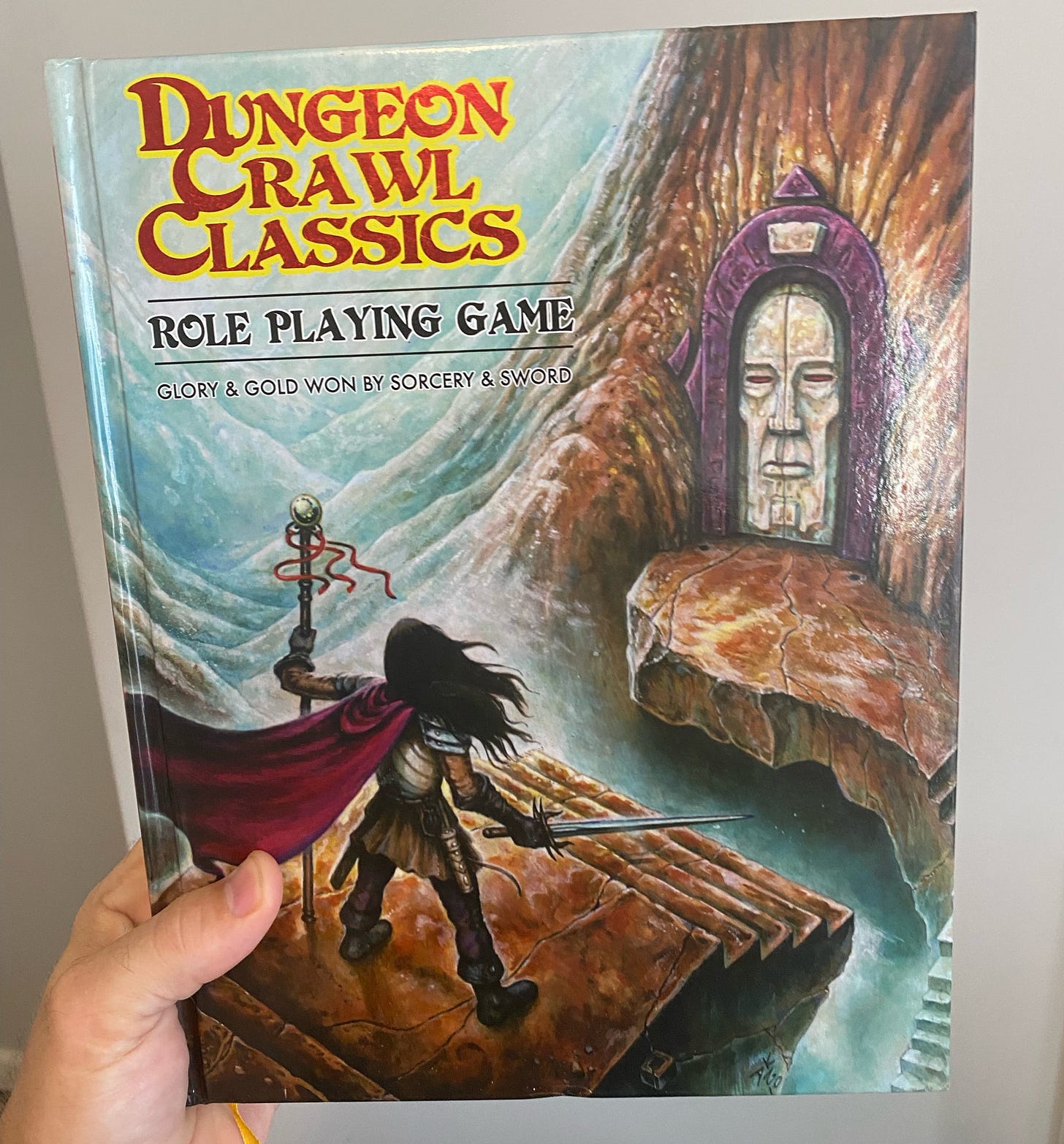
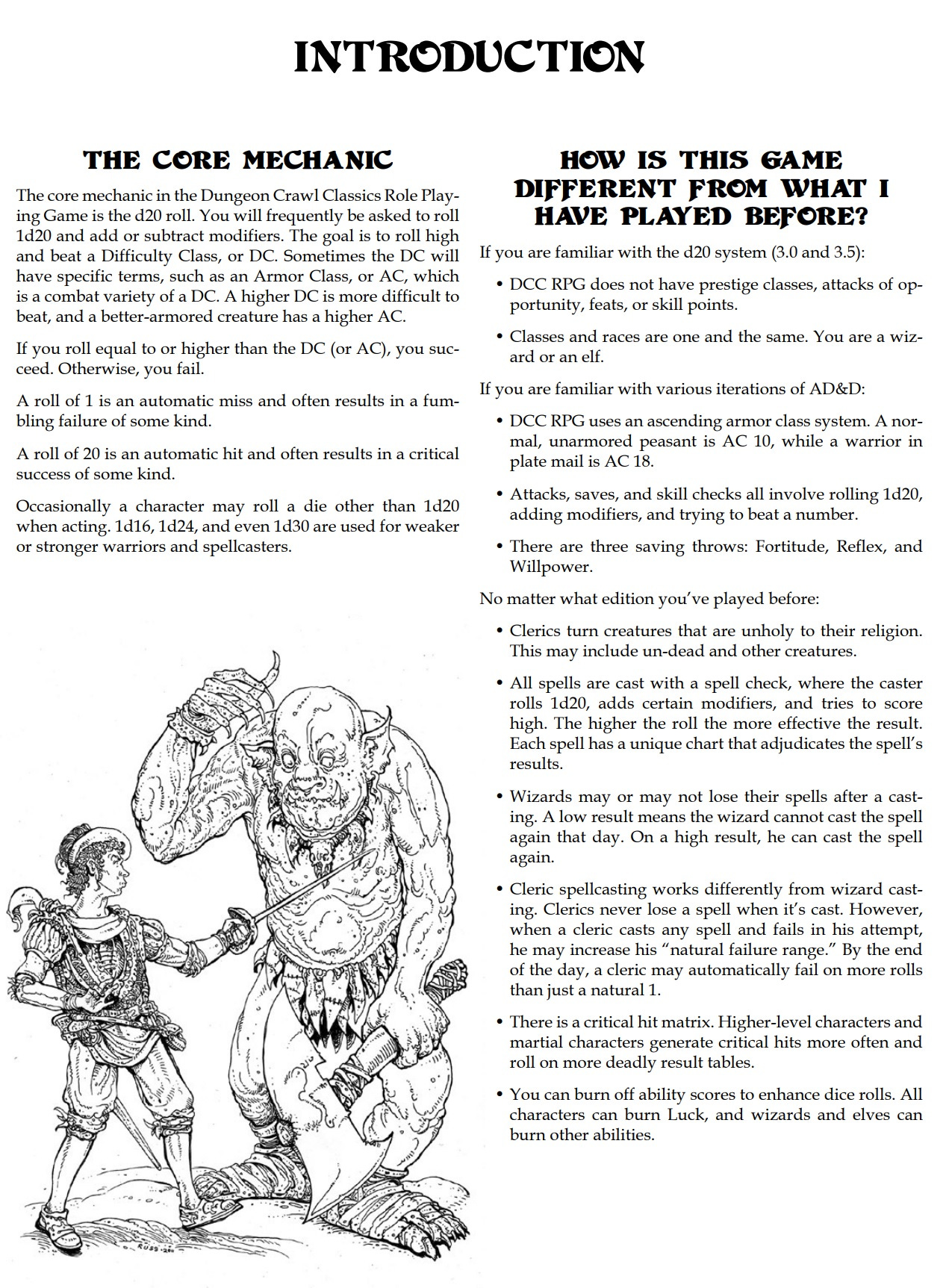

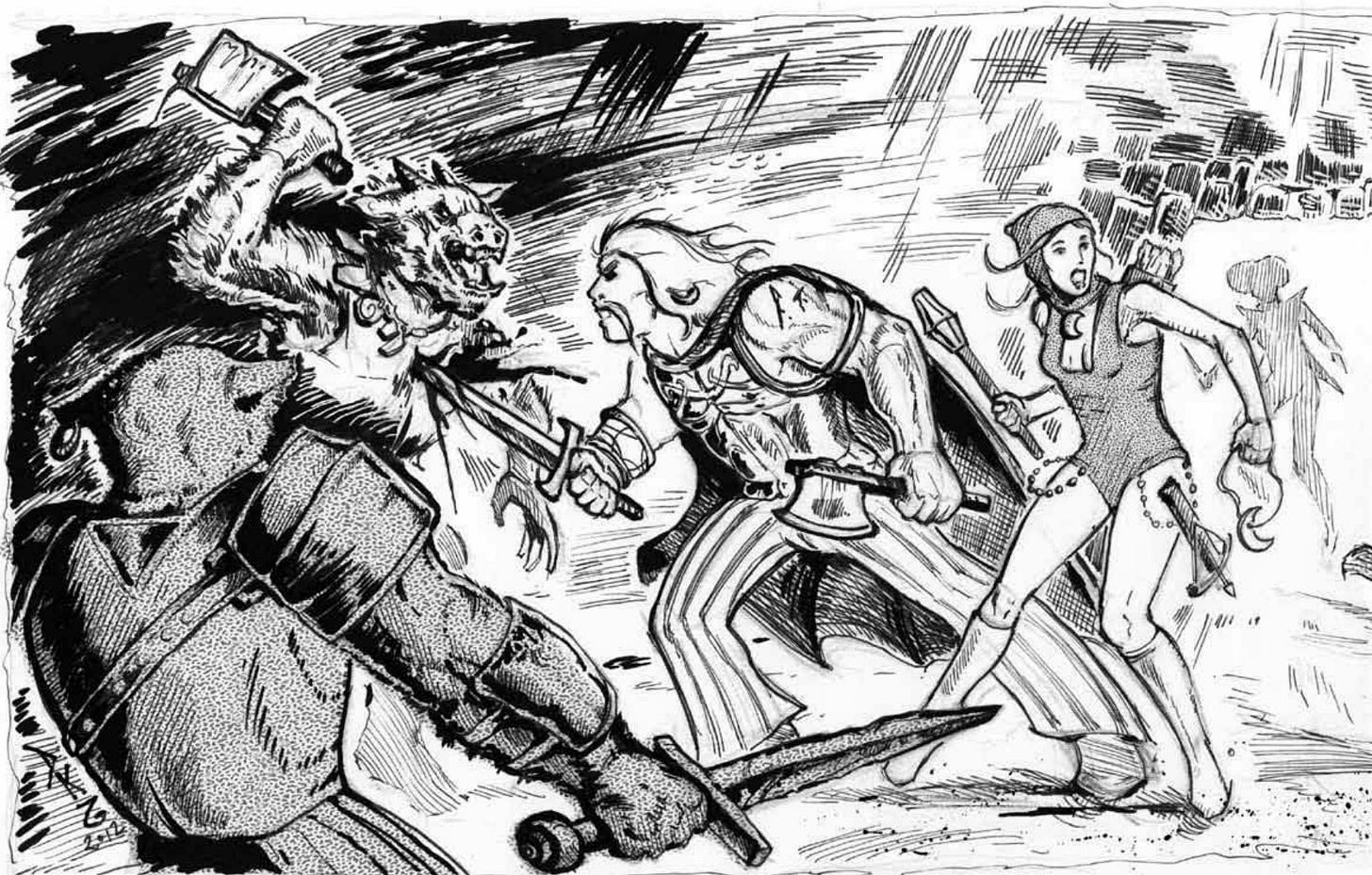






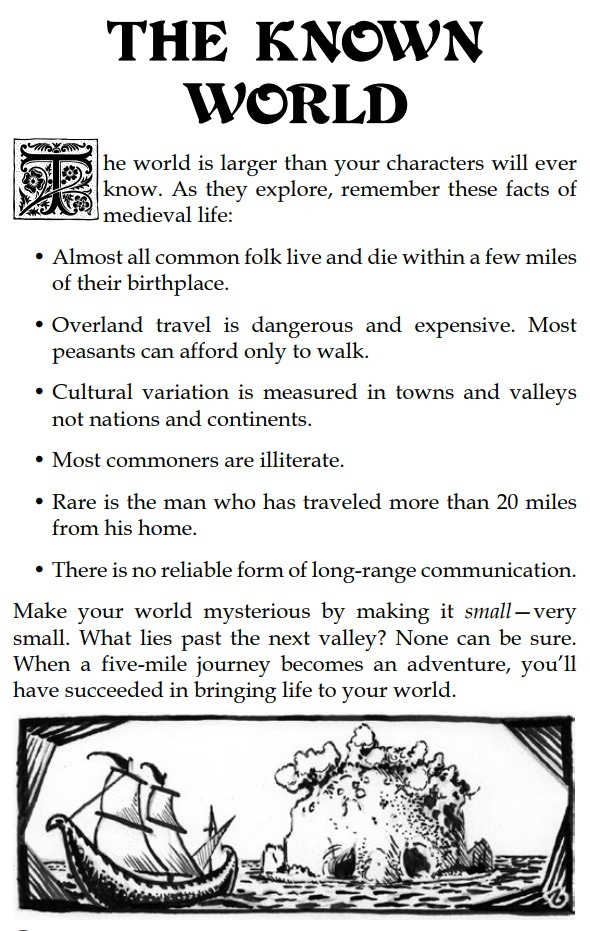

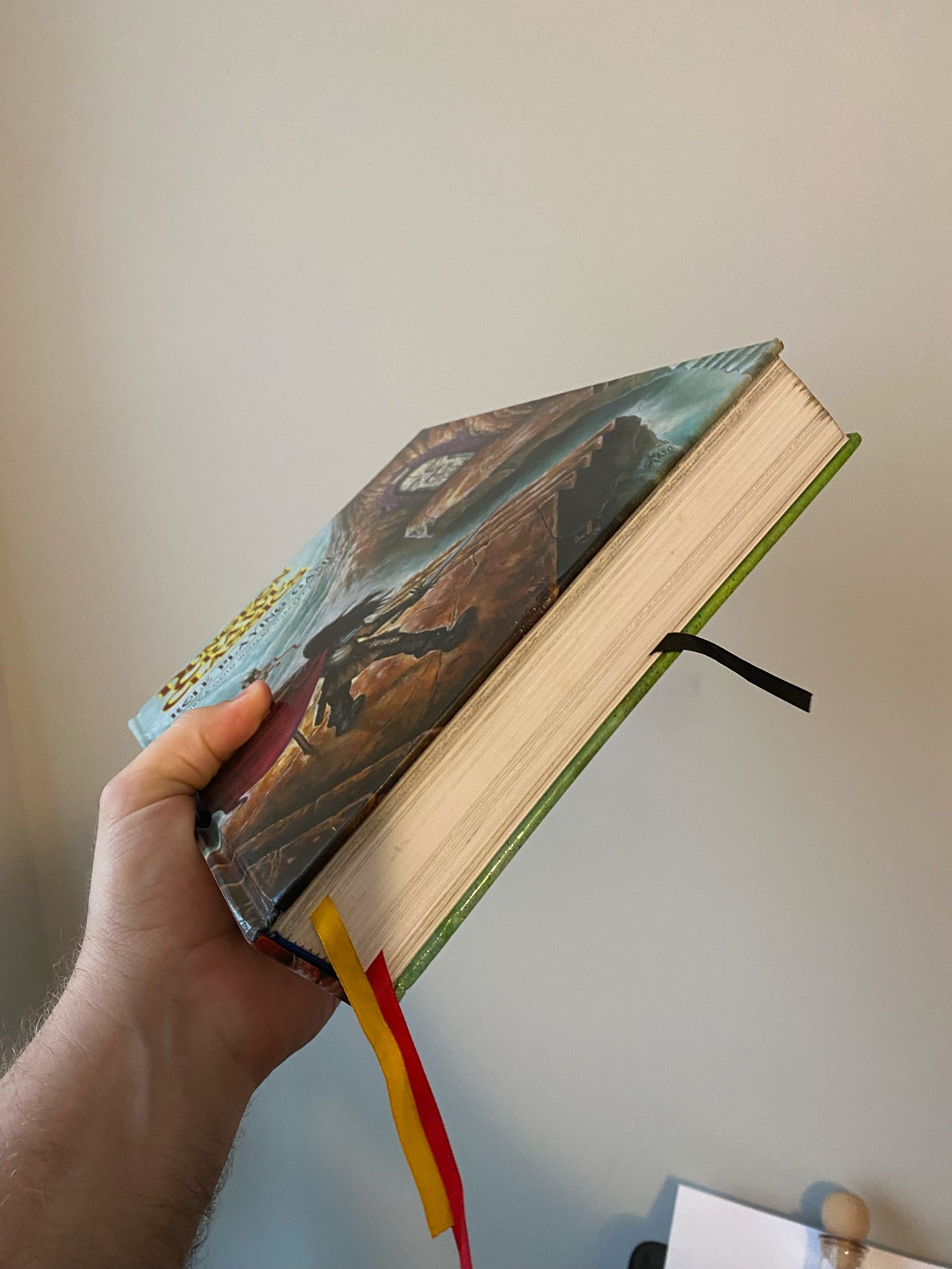
Great review!
Wow! Excellent summary of my favorite game. In my 34! years of gaming, DCC has given me incomparable experiences, most of which are direct results of dice rolls or spell results. It really embraces emergent storytelling. I still play lots of other games, but when I want to play something that I know is going to be fun and do the unexpected, I pick up DCC.